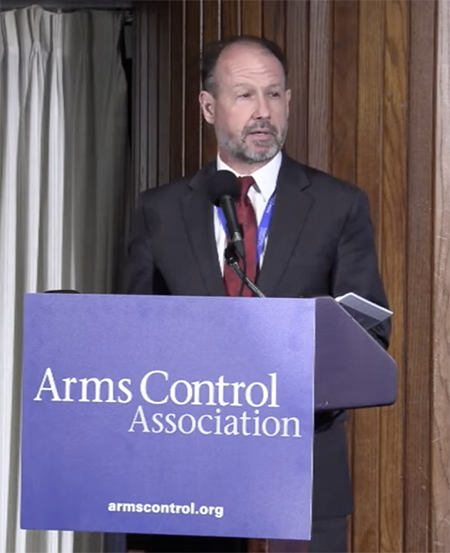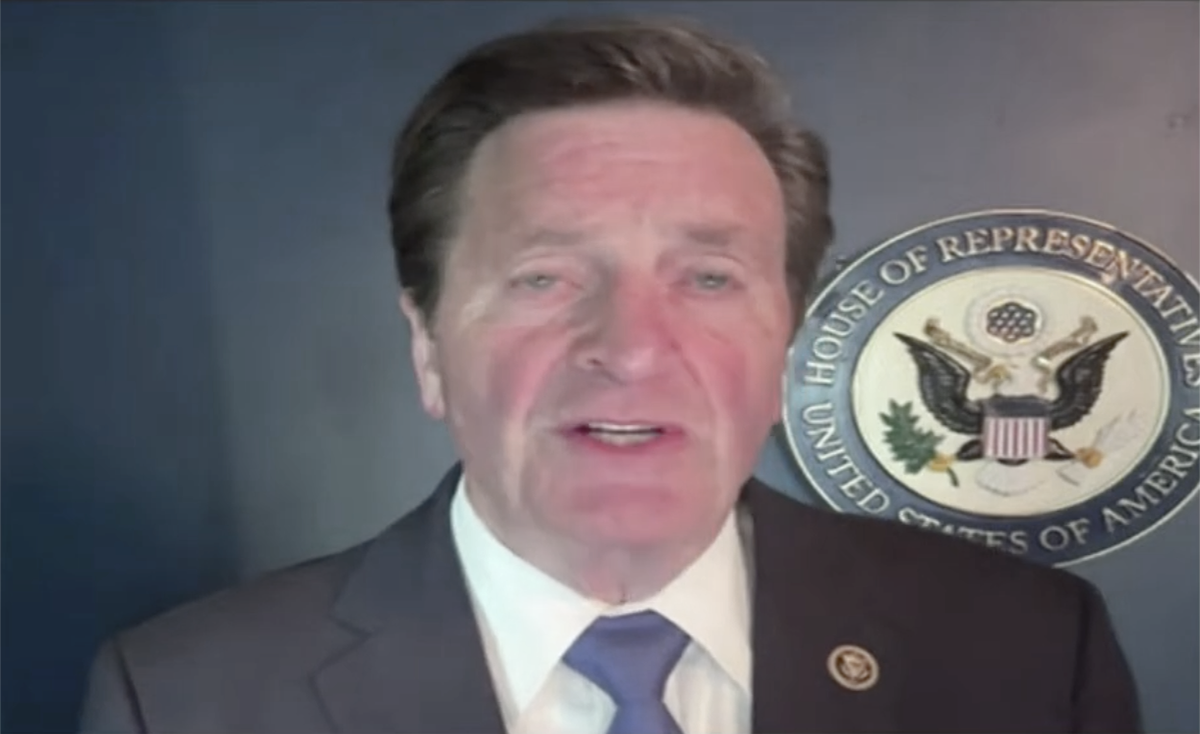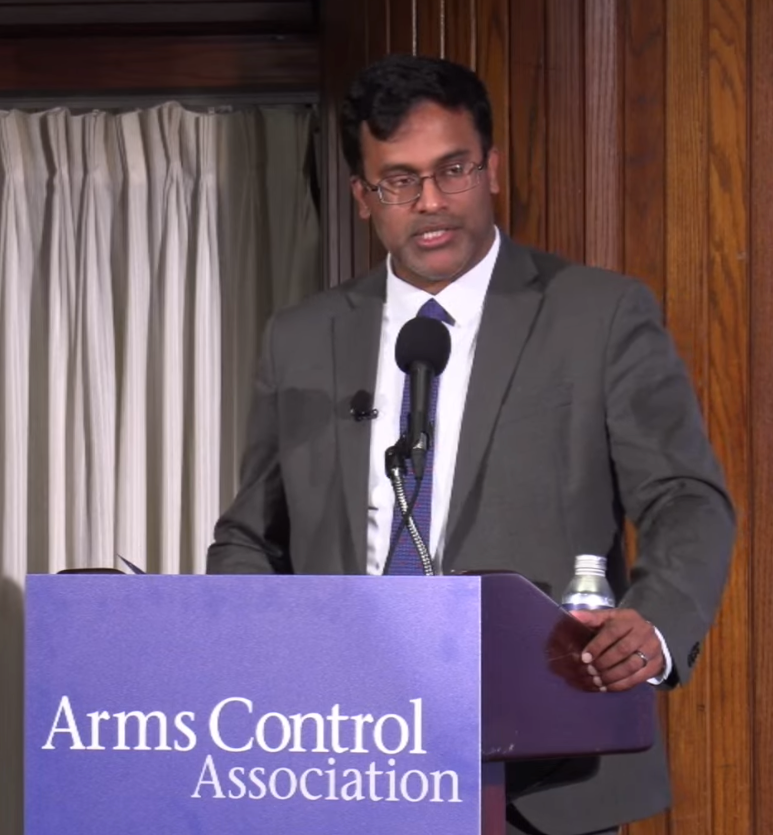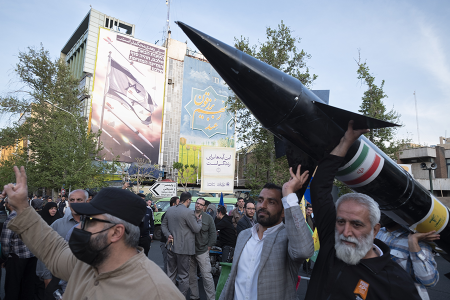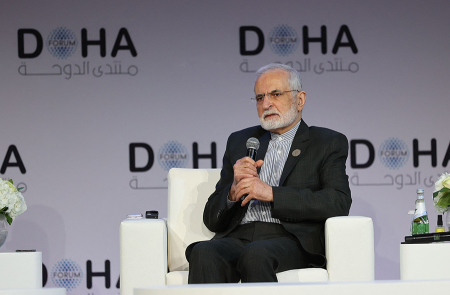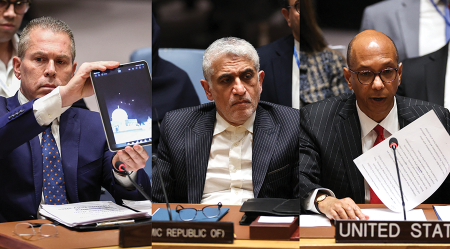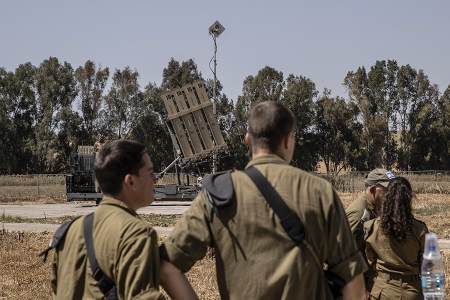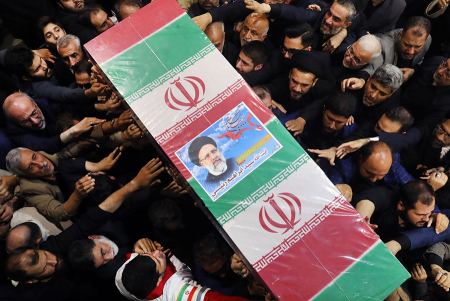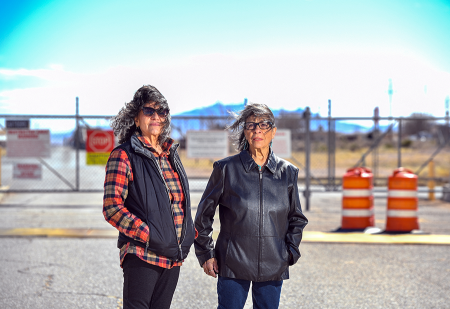Charting Future Paths for Nuclear Arms Control and Disarmament
Remarks by Thomas Countryman, Chair of the Arms Control Association board of director, at the 2024 Annual Meeting.
Remarks by Thomas Countryman, Chair of the Arms Control Association board of director, at the 2024 Annual Meeting.
June 7, 2024
For a number of reasons, many of which have been discussed today, this is a very difficult, dangerous, pivotal moment in the long journey to address the dangers posed by nuclear weapons. So, what kind of a talk can I give you today?
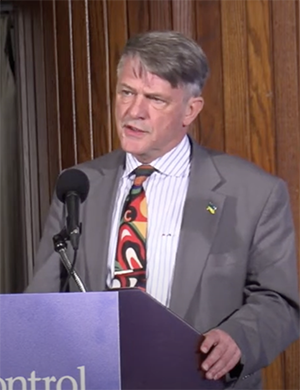
Well, this is not a graveside eulogy. Reports of the death of arms control are greatly—and deliberately—exaggerated.
This is not a religious service, where the pastor tells the faithful—in gory detail—what awaits the sinners who are not in church.
It’s also not a cable news show, where pundits bemoan the perilous state of the world (or of an election) and ask plaintively “Won’t somebody do something?”
I think it is a little more like a football coach’s locker room pep talk, fine-tuning the game plan for the second half.
So today, I will offer some thoughts not just on what we want from the possessors of nuclear weapons—what they must do—but also what this community and others need to do to effect a change in direction.
This moment is dangerous NOT because world governments have forgotten the risk of nuclear war, but because too many world leaders no longer see it as the overriding existential risk. After the Cuban crisis of 1962, two superpowers recognized that if nuclear destruction were not averted, no other national goals mattered.
Today is different. At least Moscow views the risk of nuclear war as secondary to the risk of failing in its goal of territorial expansion. And this drives reactive decisions in other capitals.
As Secretary-General Guterres noted in his remarks, the primary responsibility for addressing nuclear risk continues to lie with the owners of the two supersized arsenals, the United States and the Russian Federation. The refusal of Russia to engage in any kind of bilateral discussion is not just irresponsible, it is inconsistent with a history in which arms control dialogue continued, even at a time when one side’s weapons were killing the other side’s soldiers, in Vietnam or Afghanistan.
Just as unfortunately, in response to Moscow’s refusal, many officials in this city shrug their shoulders and say, “We tried arms control; now let’s rebuild our arsenal.” That ignores a central lesson of the fifty years in which arms control negotiations improved America’s national security. That lesson is that the indispensable ingredient is American creativity, American persistence, American leadership. Note that leadership does not mean American dominance or American control of a process—it simply means tireless determination. At this moment, it means refusing to take "no" as the final answer.
As Pavel Podvig writes in the May issue of Arms Control Today, there exists still both a conceptual basis and a historical basis for Washington and Moscow to reach a successor agreement to New START those addresses both states’ national security interests. As he notes, the political change that would make negotiation possible “may seem distant today, but it may be closer than it appears.”
There still exists a place where Russian and American officials speak to each other on nuclear issues: the P5 process. At a moment when bilateral dialogue is impossible, the P5 dialogue should assume greater importance. In a private dialogue, new steps—small or large—can be explored without the posturing and the point-scoring that marks the public debate in Geneva, or New York, or Vienna.
China will soon assume, for one year, the chairmanship of this process. Recall that last year Presidents Biden and Xi agreed that proliferation concerns was one topic on which the two sides need to cooperate. It is my deep hope that China will show some ambition, equal to the importance that it claims in world affairs, that it will increase the frequency of P5 meetings, elevate their level, and expand their agenda. They don't need to focus on reaching consensus among the five on every issue; they do need to focus on listening and on mutual understanding.
As I noted, the primary responsibility for progress lies with Washington and Moscow. France, and China, and the United Kingdom are not off the hook, however. They do not have the option of sitting on the sideline, waiting for the U.S. and Russia. They must recognize—and respond to—the overwhelming view of non-weapon states that the P5 are failing to meet—and even consciously ignoring—their obligations under the Nonproliferation Treaty.
Let me say a little bit about what we should expect and demand from the non-nuclear weapon states.
I am impressed by the way the non-weapon states parties to the NPT have stepped up in recent years. They correctly concluded that arms control initiatives are urgently needed—so urgently that the initiative should not rest only with the P5. One result was the Treaty on the Prohibition of Nuclear Weapons, an admirable if imperfect document.
Non-weapon states now need to step up higher if we are to preserve the essential norms of global security. As the late Michael Krepon described them, these are the norms against use or threats of use, against nuclear testing, and against the transfer and proliferation of nuclear weapons.
So, let's be specific: when President Putin and his acolytes make nuclear threats, there is no audible pushback from the non-nuclear world, only a deafening silence. Saying out loud that such threats—whether subtle or explicit—are unacceptable to the international community is NOT taking sides on the war in Ukraine; it is simply living up to the principles that non-nuclear states proclaim in the sound-proof chambers in Geneva and New York. Mr. Putin does not expect anyone to endorse his methods, but because he does not hear anyone outside of NATO criticizing his threatening words, he will continue to use them.
Let's be more specific: the level of the speaker matters. When I was an assistant secretary of state, I took the statements of my counterparts to represent accurately the positions of their governments. but presidents and prime ministers do not listen to their own assistant secretaries and assistant ministers as closely as they listen to other presidents and prime ministers. If arms control concerns are not conveyed at a higher level directly to the leaders of the P5 states, those leaders will conclude—correctly, perhaps—that nuclear issues are of lower importance to the rest of the world. Putin is not the only leader who needs to hear directly from other world leaders, but his is the right address to begin.
Non-weapon states also have a duty to preserve the nonproliferation pillar of the NPT. At a moment when several states speak openly about leaving the Treaty or developing their own nuclear arsenal, non-weapon states need to speak with one voice; they should declare, jointly and publicly, that any such move would make it impossible to continue normal political and economic relations with a new weapons-possessing state.
All of these are ideas that we have to convey loudly to the world’s governments, and since we are here in Washington, we need to start with the United States government. Our public statements need to support the White House when it says or does the right thing. The best example was the statement Jake Sullivan made here one year ago when he said the nuclear arsenal was sufficient for deterrence for the foreseeable future and declared that the U.S. wanted bilateral dialogue with Russia without preconditions. (Sadly, at least a few people in the U.S. government seemed to believe that Mr. Sullivan’s offer has been overtaken by events and is now no longer relevant.)
At the same time, we have to be vocal about backward steps and persistent in convincing this government and others that there are alternatives to a new nuclear arms race. Our work to reduce and eliminate the threat of nuclear weapons must be informed by the catastrophic humanitarian impacts of nuclear war, but our dialogue with policymakers must also recognize the validity of genuine national security concerns, made more and more obvious by threatening rhetoric from nuclear-possessing states. We can critique the flaws in deterrence theory and postures, but we can’t simply dismiss deterrence as a concept without offering realistic alternatives sufficient to provide security.
The Arms Control Association, this tiny but mighty team, with great analytic contributions from so many of you in this room, has worked to analyze and address the questions that should be discussed among governments. Can our national security be better protected by concepts of sufficiency rather than symmetry? Are we tied to ratified treaties as the best form of agreements, or can we find new forms (which sometimes means old forms) of bilateral and multilateral agreements, focusing as much on behavior and transparency as on numbers? How do we achieve the goal that Presidents Xi and Biden agreed to pursue, maintaining human control of nuclear decisions?
It is also important as we push back against those who argue that arms control is dead or dying that we do one thing better than government spokesmen or diplomats: we have to speak with an air of civility, even when those who disagree with us are condescending or insulting. As in diplomacy, anyone in or out of government who is trying to solve the same vexing issues should be seen as a potential partner, not an eternal adversary.
Our target audience is broad, perhaps impossibly broad for the size of our community. In Washington, as in other countries, it comprises political and military leadership and workers—thousands of dedicated specialists—as well as the Congress. We need new ways to appeal to public opinion and to mobilize public engagement, and that door is more open at this moment when more citizens are aware of nuclear risk than at any time in the last forty, or perhaps sixty years.
We cannot avoid the awareness that elections matter. Since the 1950s, every U.S. president—except one—has acknowledged that arms control IS national security; that it can be win-win, not zero-sum; that speaking to an adversary is a sign of confidence, not of weakness; that insisting on absolute American sovereignty or American dominance in arsenals is a recipe for tragic conflict. The results here on November 5 will affect the strategy of our efforts, but not their urgency.
In particular, we have to look to younger people, the generation from which I draw my daily dose of optimism. Are we doing enough to raise their consciousness, to equip them with the concepts and analytic tools to address the dilemmas that my generation is leaving to them? I was pulled kicking and screaming into the 21st Century, and I don’t know how to get meaningful news and analysis from TikTok or other social media. But millions of young people do, and we have to meet them where they are, where they read, where they watch, where they think.
In one way, I am nostalgic for the 1980s, when millions of people in the U.S. and abroad mobilized in support of saner responsible nuclear policies and arms control diplomacy to halt and reverse the arms race; their activism convinced national leaders that sensible national security pays political dividends. We live in a different time that requires new alliances and strategies. I am heartened—but confess also envious—when I see millions of people, primarily young people, demanding responsible action on climate change, the other existential threat we face. I recommend an article in Arms Control Today last November by Ambassador Kenneth Brill. He notes there should be, there must be a common cause between climate change activists demanding a secure and prosperous future and nuclear activists who are simply demanding a future.
It’s a long list of tasks and it can be discouraging. Setbacks have been frequent, and advances have only been at the margins. The issues are many and our numbers are not. As fishermen traditionally pray: “The sea is so wide, Lord, and my boat is so small.” The total annual budget for all of the organizations working in this field—in the U.S. and elsewhere—is less than governments spend on nuclear weapons in half a day.
As John Kennedy said about going to the moon: “We choose to do this not because it is easy, but because it is hard, because the goal will organize and measure the best of our energies and skills, because the challenge is one we are unwilling to postpone”.
I still believe—despite all evidence to the contrary—that humans are better at solving problems than at creating problems. In September 1962, nobody would have predicted that within a few months, Moscow and Washington would initiate decades of world-changing negotiations, making both nations safer.
Today, we both need to work to prevent the breakdown moment when guardrails against nuclear catastrophe evaporate, and be prepared to seize the breakthrough moment, when we can advance again in the direction of the security of a world free of nuclear weapons. Your contributions now—whether in time, or money, or analysis, or activism—will be crucial as we head toward that moment.
Now I realize that this was more like a church sermon than a locker room pep talk. I can tell because I can see a couple of people nodding off. I want to simply thank you for your attention and above all thank you—tomorrow—for your commitment.
God bless.

